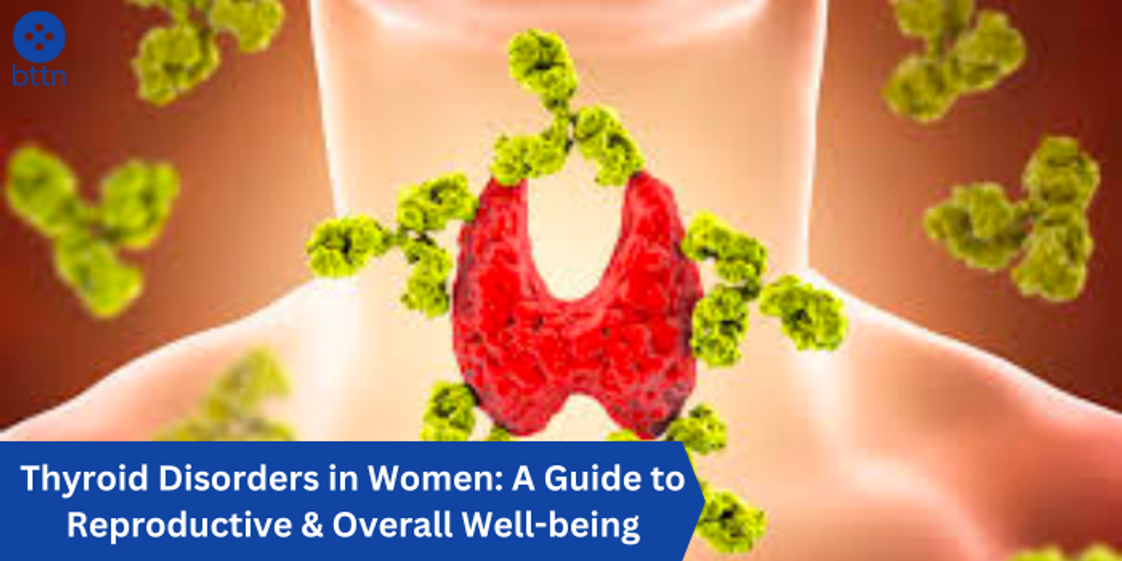
Thyroid Disorders in Women: A Guide to Reproductive & Overall Well-being
Posted by Pankaj Dhiman on Feb 5th 2024
The Thyroid & Your Body's Symphony:
The thyroid produces hormones that regulate your metabolism, energy levels, mood, and even your heart rate. When this delicate symphony is disrupted, either by underproduction (hypothyroidism) or overproduction (hyperthyroidism) of thyroid hormones, a cascade of symptoms can arise.
Must Read: Bone Cancer: What You Need to Know
Thyroid & Reproduction: An Intertwined Journey:
For women, the thyroid's influence goes beyond basic functioning. It intricately interacts with the reproductive system, impacting:
- Menstrual Cycle: Irregular periods, heavy bleeding, and even amenorrhea (absence of periods) can be linked to thyroid imbalances.
- Fertility: Both hypothyroidism and hyperthyroidism can affect ovulation, making conception challenging.
- Pregnancy: Untreated thyroid disorders during pregnancy can lead to complications like preterm birth, low birth weight, and even developmental issues in the baby.
Must Read: A Complete Guide to Dysphoria: Don't Suffer in Silence
Common Thyroid Disorders in Women:
- Hypothyroidism: The most common thyroid disorder, affecting around 5% of women in the US. Symptoms include fatigue, weight gain, sensitivity to cold, and hair loss.
- Hyperthyroidism: Less common, affecting around 1% of women. Symptoms include anxiety, irregular heartbeat, heat intolerance, and weight loss despite normal or increased appetite.
- Postpartum Thyroiditis: An inflammation of the thyroid gland that can occur after childbirth, affecting up to 10% of women.
Must Read: Neuromuscular Disorders: Types, Symptoms, Diagnosis & Treatment Options
Recognizing the Signs & Symptoms:
While some thyroid disorders present with classic symptoms like weight changes or fatigue, others can be subtle. Be mindful of:
- Menstrual irregularities: Changes in cycle length, flow, or presence of periods.
- Fertility issues: Difficulty getting pregnant or experiencing miscarriages.
- Mood swings: Unexplained anxiety, depression, or irritability.
- Sleep disturbances: Difficulty falling asleep or staying asleep.
- Skin and hair changes: Dry skin, hair loss, or brittle nails.
Must Read: Iron Pills: Side Effects and Benefits of Supplements for Optimal Health
Taking Charge of Your Thyroid Health:
Early diagnosis and treatment are key to managing thyroid disorders effectively. Here's what you can do:
- Talk to your doctor: Discuss your concerns and family history of thyroid problems.
- Get screened: Regular thyroid function tests are recommended, especially during pregnancy and menopause.
- Embrace healthy habits: Maintain a balanced diet rich in iodine and selenium, manage stress, and get regular exercise.
- Seek support: Connect with online communities or support groups for guidance and shared experiences.
Life Stages and Thyroid Health:
- Puberty: Early or delayed puberty can be a sign of thyroid issues.
- Pregnancy: Regular thyroid monitoring and medication adjustments are crucial.
- Postpartum: Be alert for postpartum thyroiditis and seek timely treatment.
- Menopause: Hormonal fluctuations can affect thyroid function. Discuss thyroid screening with your doctor.
Remember: You are not alone. Millions of women worldwide navigate thyroid disorders. By understanding its impact on your reproductive health and overall well-being, you can take charge, advocate for your health, and thrive on your journey.
Additional Resources:
- American Thyroid Association: [https://www.thyroid.org/]
- National Institutes of Health:
- Office on Women's Health: [https://www.womenshealth.gov/a-z-topics/thyroid-disease]
Disclaimer: This blog is intended for informational purposes only and does not substitute for professional medical advice. Always consult your healthcare provider for diagnosis and treatment of any medical condition.
